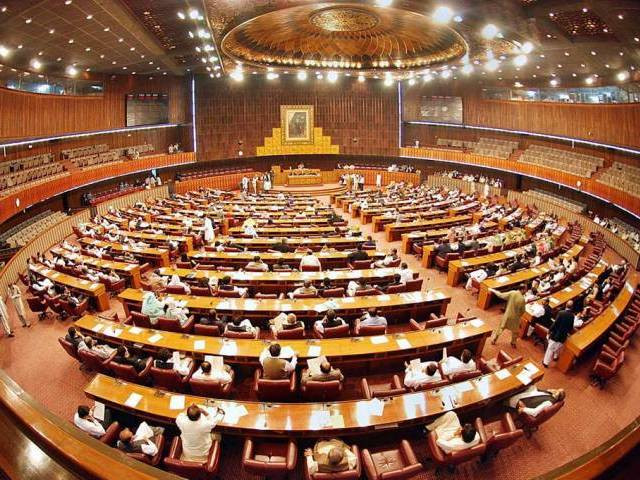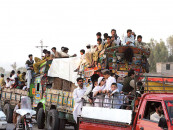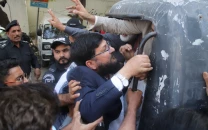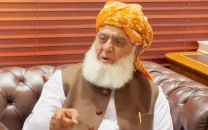Kashmir committee grills Twitter official on freed of speech
Panel receives briefing from PTA, Pemra chief on projecting Kashmir cause

The Parliamentary Committee on Kashmir on Tuesday grilled the regional head of social media platform, Twitter, for silencing voices of thousands of Kashmiri and Pakistani activists projecting the plight of people of Indian Illegally Occupied Jammu and Kashmir (IIOJK).
In a special hearing held the Parliament House, Committee Chairman Shehryar Khan Afridi led the questioning of George Salama, who heads the Twitter regional offices in the United Arab Emirates, about the website’s policy on human rights and freedom of speech and other related matters.
Afridi asked Salama whether Twitter regulations did not conform to the UN Charter on freedom of speech and freedom of expression. Salama, who attended the meeting through Zoom, said that Twitter has a specific policy and discourages hate speech and upholds freedom of expression. He said Twitter authorities would ensure freedom of speech to all, and voices of minorities would never be silenced.
Responding to a query from Afridi about the misuse of Twitter regulations by Indian activists as exposed by EU DisinfoLab, Salama said that Twitter management always ensures freedom of speech on social media. He added that Kashmiri activists are free to raise their voice with legitimate accounts. He offered to organise workshops on Twitter regulations in Pakistan along with the PTA for awareness of Pakistani and Kashmiri social media activists.
Afridi said that when he was interior minister two years ago, Indian social media activists impersonating as Pakistanis were generating 80 tweets per minute from Indian cities to incite violence in Pakistan over the blasphemy issue. He added that Twitter unfortunately had double standards as no action was taken against Indian agents, posting tweets aimed at inciting hate and violence in Pakistan.
He said that over 8 million people of IIOJK are being silenced under influence of Indian employees of Twitter. Salama said that Twitter has zero tolerance against hate speech and violence. Twitter discourages posting misleading content through fake accounts, once reported, he added.
Salama said that overlapping and duplicate contents are also discouraged by the Twitter management.
Afridi raised the issue of the misuse of UAPA black law by Indian occupational authorities and silencing of voices of the Kashmiris.
Responding to another query, Salama said that Twitter’s position is that it would remain equal for all parties of the conflict zone. “We are working closely with the PTA to ensure equal opportunities to social media users,” he said.
The meeting was attended by the members of the committee, while Law Minister Dr Farogh Naseem, Information and Broadcasting Secretary Shaheera Shahid and other senior officials were also present on the occasion.
During the meeting, the committee was informed that till-date it did not have its rules of procedures. Afridi urged the committee members to come forward and show interest in heading various advisory boards so that the subcommittees could be formed. Barrister Mohammad Ali Saif was nominated as convener of the subcommittee on Advisory Board on Lawfare for Kashmir.
The PTA chairman briefed the committee on the suspension of social media accounts under influence of Indian operators since August 5, 2019. He said that the PTA raised the suspension of accounts of Pakistani users under influence of a certain country and Twitter management responded that users are free to accept or deny Twitter rules.
He said the federal cabinet passed social media rules under which social media companies are bound to keep physical presence in Pakistan. He added that once the PTA reports any account, Twitter would have to comply within 24 hours.
Dr Farogh Naseem briefed the committee on the local and international laws on freedom of speech and freedom of information for the 8 million Kashmiris. “We have already won our case of sovereignty on Jammu and Kashmir in the United Nations and Jammu Kashmir dispute must be resolved according to the international law,” the minister said.
The Pemra chairman briefed the committee that private and public television channels have been contributing hugely to raise awareness on the dispute of Jammu and Kashmir. Asked by Afridi whether the private channels were also focusing on developing films and dramas on the plight of caged people of Kashmir, the Pemra chairman said that this year on Kashmir Solidarity Day on February 5, some channels did not turn their logos back and Pemra was going to issue show-cause notices to those TV channels.
Afridi said that under the Corporate Social Responsibility (CSR), private television channels and media houses are bound to project Kashmir dispute and India's illegal occupation of Jammu and Kashmir and plight of the Kashmiris. The Pemra Chairman sought time to present a report on tele-films and dramas on Kashmir dispute.
Afridi argued why Pemra was silent on the contents of private channels' dramas about the sensitive relations, the Pemra Chairman said that the institution had banned three dramas of private channels but the court had struck down the decision.
He said that entire Indian content had been banned by Pemra. He added that private TV channels were not developing any content on Kashmir and only content generated by public institutions was being run by private media. The committee chairman expressed dissatisfaction over the performance of the Pemra regarding highlighting Kashmir cause on private TV channels.
A Pakistan Television representative briefed the committee on the projection of Kashmir dispute on the state television. The Kashmir Committee Chairman directed the Pemra chairman and the managing director of the PTV to present a detailed report on the performance of both the state institutions on raising awareness about the Kashmir dispute.
APP



















COMMENTS
Comments are moderated and generally will be posted if they are on-topic and not abusive.
For more information, please see our Comments FAQ